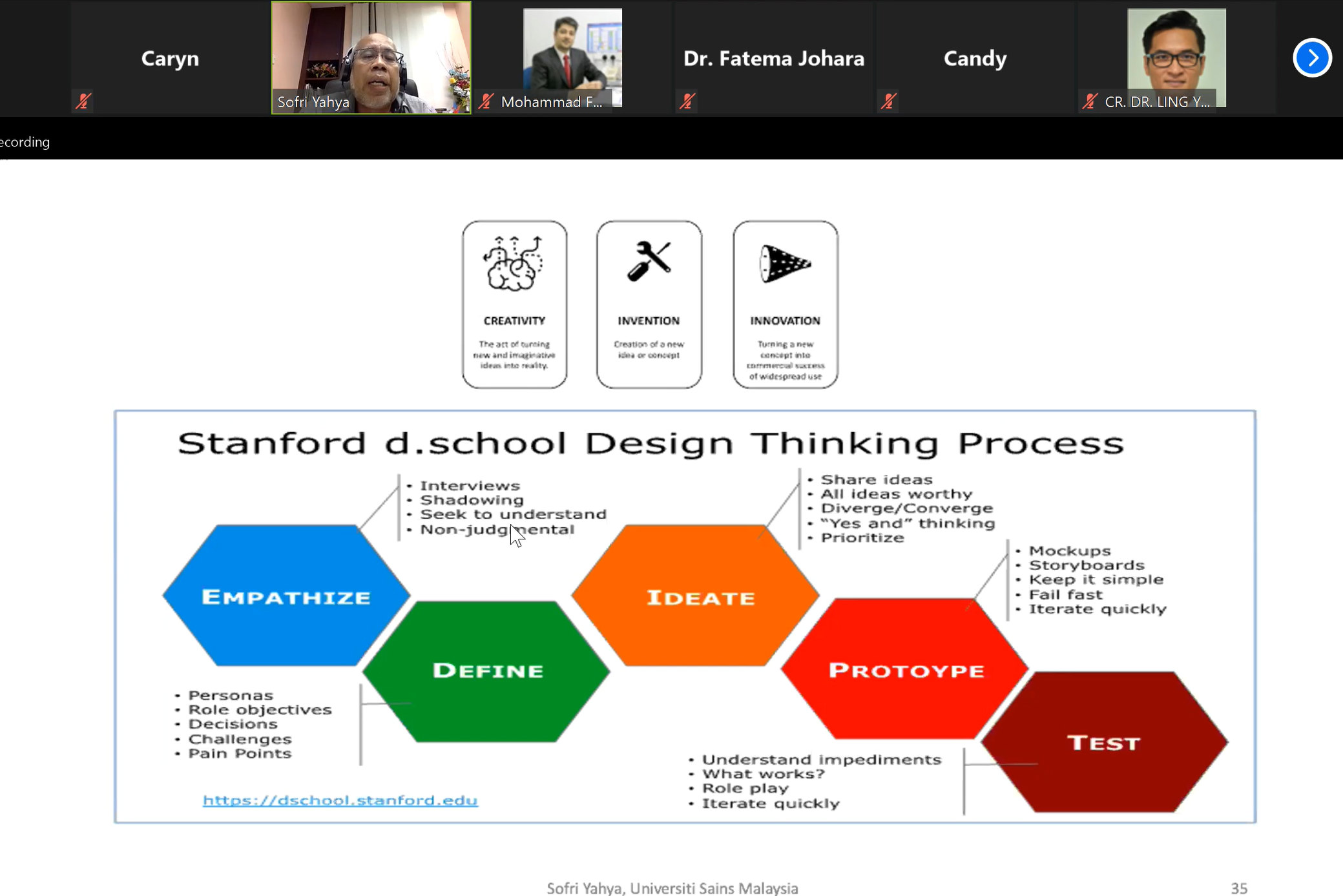
.png)
Prof Sofri during the webinar
Design Thinking is a paradigm that focuses on the human being to integrate
people, technology and business. The Centre for Entrepreneurial
Sustainability (CENTS) organised a webinar titled, “Impactful Research on
Sustainable Business: Design Thinking Paradigm” on 28 April 2021 via Zoom.
Speaking at the webinar was Universiti Sains Malaysia Graduate School of
Business Prof Dr Sofri Yahya who is a Professor in strategic innovation and
coach of design thinking and former DRB-HICOM University Deputy
Vice-Chancellor of Academic and Research.
As countries around the world face an unprecedented health crisis and
domestic business downturns, many were looking for new ways to address the
issues. Under these circumstances, it became even more essential to shift
our paradigms or revisit the way we perceive research. The webinar discussed
the application of Design Thinking as a methodology of conducting research
in the areas of business. “This webinar is to upgrade the world’s ability to
solve problems through design and thinking. If we apply the methodology
properly, it should help researchers to produce research outputs which are
not only more meaningful but also more impactful to the stakeholders,” said
Prof Sofri.
Another paradigm is also known as personal focused versus stakeholder
centred. As a design thinker, there is a need to emphasise more on the
stakeholders. “We could get better at solving the right problems. The issue
with problem-solving is overlooking the causes as we focused on the
symptoms. When you are resolving a problem, it’s important to understand the
difference between the cause and the symptom. A symptom is an indicator or a
sign that a problem exists. For instance, if your team has low productivity,
it is a sign of a problem, unproductiveness does not happen by itself and
cannot be resolved by itself. The underlying problem may be due to low
morale which is due to heavy overtime, boredom, poor management, low pay and
other related factors. In other words, when you resolve an issue, you must
address the cause of the problem, not the related symptom. The final cause
can be referred to as the root cause,” added Prof Sofri.

Prof Sofri explaining the design thinking process
Prof Sofri explained, “Clarity is power. The purpose to conduct research
needs to be clear and it must have an impact on the society. Anybody
can join the debate about the future of humanity, but it is hard to maintain
a clear vision. Frequently, we do not even notice that a debate is going on,
or what the key questions are. Unfortunately, history gives no discounts. If
the future of humanity is decided in our absence because we are too busy
with our work, all of us will not be exempted from consequences. As
researchers, we cannot give people money, food, or clothes but we can try to
offer clarity, thereby helping to level the global playing field.”
He then introduced the topic “Redesigning one’s thinking”. “It’s not only a
process or methodology, it is also known as a paradigm. Design thinking is a
methodology for creative problem solving that shapes the way we perceive
things and how to solve problems and conduct research. Design thinking is a
human-centred approach to solve problems innovatively that draws (heuristic)
from the designer’s toolkit to integrate the needs of people (desirable),
the possibilities of technology, (feasible), the requirements for business
success (viable) and sustainable,” said Prof Sofri.
.png)
CENTS Chairperson Dr Mohammad Falahat Nejadmahani (top row, far left) and
Prof Sofri (top row, middle) with the participants
Wholly owned by UTAR Education Foundation (200201010564(578227-M)) LEGAL STATEMENT TERM OF USAGE PRIVACY NOTICE